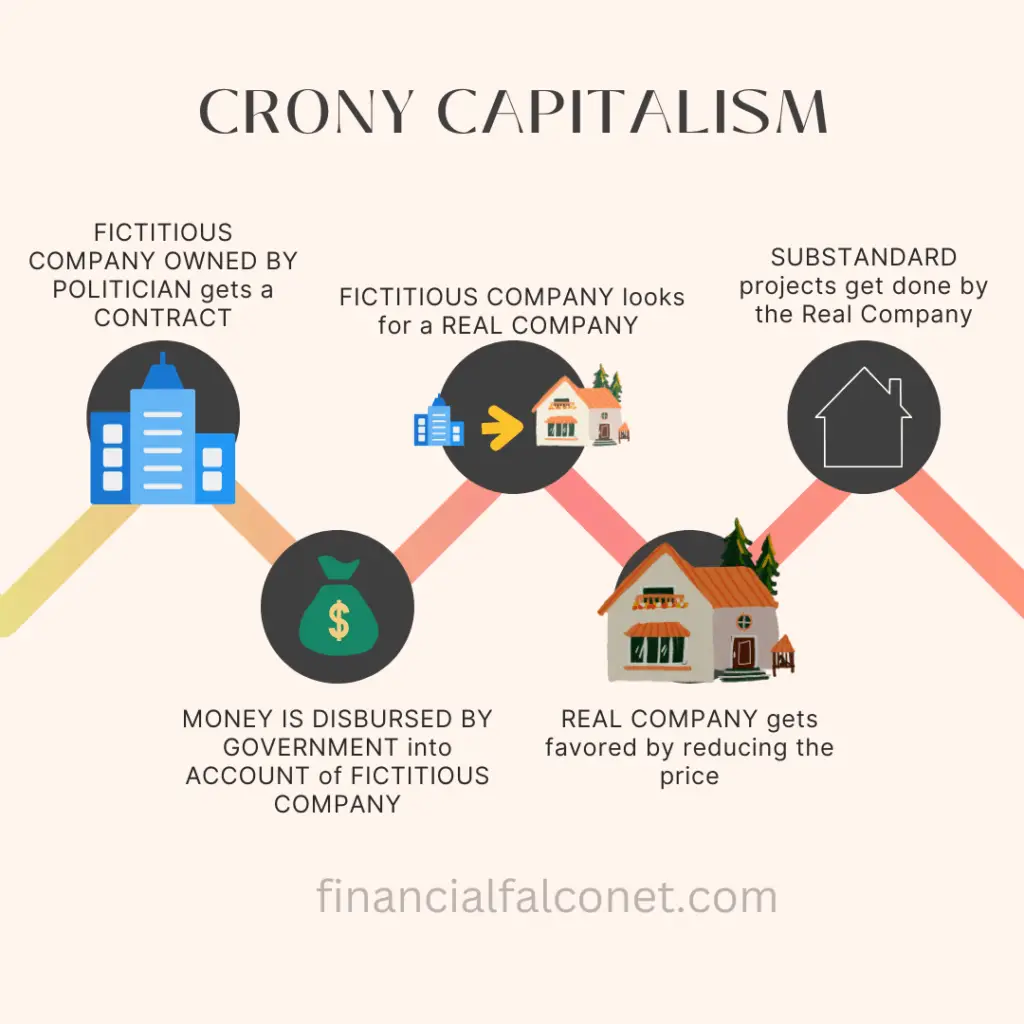Crony Capitalism (cronyism) is a system of running an economy in which the government gives preferential treatment to some businesses for many reasons, often not for the common good of the economy but for personal benefits; the businesses in turn reciprocate the favors with money, gifts, etc. at the detriment of the society. Cronyism is not capitalism (in fact it does destroy capitalism and the free market system because it relies on the influence of the government to succeed). It is therefore proper to refer to it as a way through which cronies practice capitalism.
Oftentimes, the friends or elites support and finance the politicians during their political campaigns; in return the politician when in office may give tax breaks, easy access to forex, award of tariff exemptions, etc, where other competitors may not have the same privilege.
In this article, we will explore cronyism (capitalism practiced by cronies) and its effects on business and society.
What is crony capitalism?

Crony capitalism is an economic system in which businesses and individuals with political power are able to use that power to extract favorable treatment from the government. This can take the form of special tax breaks, subsidies, or regulatory changes that benefit particular companies or industries. Those being favored by cronyism are called cronies.
The businesses get preferential treatment, while the government gets its share of the profits. It’s a system that’s often been critiqued, as it gives an unfair advantage to businesses that are already established. But it seems to be the status quo in many industries today.
In a crony capitalist system, businesses compete not only on the basis of their products or services but also on their ability to influence policymakers. This often leads to corruption, as businesses seek to buy favor with those in power. Crony capitalism distorts the free market and undermines democracy.
Proponents of crony capitalism argue that it is a necessary evil in order to attract investment and spur economic growth. They also claim that it is impossible to do business without some degree of government intervention.
Related: Ordoliberalism
Effects of cronyism
- Stifling of innovations
- It leads to income inequality
- It causes monopolies and oligopolies
- Leads to corruption
- Prevents economic growth
- Cronyism capitalism leads to wastage, inefficiencies, and unproductiveness
Stifling of innovations
In a crony capitalist system, innovation is often stifled because businesses that are connected to government officials are able to use their influence to protect their market share. This lack of competition can lead to higher prices and fewer choices for consumers, as well as fewer incentives for businesses to improve their products and services.
Additionally, crony capitalism can create an environment where corruption is more likely to occur. When business leaders are able to buy political favors, it can result in them having an unfair advantage over their competitors. This can discourage other businesses from entering the market even when they can offer better products or services, as they know that they will not be able to compete on a level playing field.
It leads to income inequality
Critics say that crony capitalism is nothing more than legalized corruption that benefits the few at the expense of the many.
In a crony capitalist system, those in government give special favors to business interests in the form of bailouts, regulations, contracts, and subsidies. These create an uneven playing field where some businesses have an advantage over others.
This advantage manifests itself in higher profits and higher incomes for those who are connected to the government thereby creating income inequality because the connected businesses make more money than their competitors, and this extra money goes into the pockets of their owners and executives. The workers at these businesses may also see higher wages than similar workers at non-connected businesses, further exacerbating income inequality.
It causes monopolies and oligopolies
Since businesses collude with government officials to get special treatment in crony capitalism, this collusion leads to an unfair marketplace where some businesses have an unfair advantage. This gives them the ability to grow larger and drive out competition, leading to a monopoly.
Cronyism capitalism stifles innovation and hurts consumers by giving them fewer choices. It also means that businesses are less accountable to the public because they have the backing of the government.
It leads to corruption
Cronyism also creates opportunities for corruption to grow, as those in power can use their influence to get favorable treatment from the government. This can result in higher costs for taxpayers and lower quality of goods and services because those that are meant to regulate the companies and businesses would rather favor the businesses for their personal interests than for the interest of the country.
Prevention of economic growth
In his book, The Rise and Decline of Nations, published in 1982, Mancur Olson compared the effects of cronyism on American society. He noted that there was declining economic growth, entrepreneurship, and stagnation when compared with other countries such as Germany and Japan. Mancur Olson faulted cronyism as the cause of the decline in America’s economic growth in the post-war era. This is because of some interest groups growing powerful by taking over the United States government and using it to strangle the economy, all in their favor.
On the other hand, the economies of Japan and Germany during this era were rapidly growing because the cronies (interest groups using the government in their favor) were rendered useless or destroyed during the war. This allowed the rapid growth of these societies.
This is true because crony capitalism creates an environment where those who have money and power are able to influence government policy in their favor while doing nothing or even harming those at the lower end of the socioeconomic spectrum.
If what cronies invest in lobbying for political favors is lower than what they stand to gain, then they will prefer to divert resources from productive activities that are beneficial to the economy to spending on gaining favors that will increase their wealth. That way, the economy is harmed and they increase their wealth.
It leads to wastage, inefficiencies, and productiveness
Cronyism capitalism does not create wealth, rather it wastes resources that would have been used for more productive ventures; also, cronyism steals from those that create true wealth.
Gordon Tullock described the effect of rent seeking behavior (stealing from others by redistributing wealth to enrich yourself without truly creating wealth). He stated that the effect of rent-seeking does not end with mere redistribution of wealth but with the time, resources, and manpower involved in orchestrating this act and additional resources deployed by law enforcement to prevent or stop such acts.
When the opportunity cost is considered, the thief or rent seeker has to use resources and time to actualize the act; this time would have been used for more productive activities that will benefit society as well.
In order to prevent or stop stealing, resources have to be used for making alarm systems, employing police together with the cars and tools they need to stop thieves; also prisons are created and workers employed to manage the prisons. All these are done simply because thieves decided to steal instead of using their time and resources for productive purposes. This same scenario plays out in rent-seeking behavior of cronyism capitalism because it cripples the economy and causes wastage. Resources used for bribing government officials would have been put into productive activities.
What did crony capitalism imply?
In simple terms, crony capitalism implies businesses and individuals with political connections would receive favorable treatment from the government in the form of special tax breaks, government contracts, or regulations that make it difficult for new businesses to compete.
Cronyism is unfair and corrupt, as it gives an advantage to those who are already in a position of power. This can lead to a situation where only a few large companies control an entire industry, making it difficult for new businesses to get started; since those in power may use their influence to get favors for themselves rather than working in the best interests of the people they are supposed to be representing, the whole economy and the people would be affected eventually in cronyism.
Examples of Crony Capitalism
Crony capitalism examples exist in many countries and industries. We will outline these examples in terms of the activities that are regarded as rent seeking (that is, what activities are regarded as acts of crony capitalism?) then we will look at some countries where cronyism capitalism is being practiced.
Rent seeking behaviors regarded as crony capitalism examples
- Color of law
- Tax evasions/Tax breaks
- Sale of government assets to friends or self
Tax evasions/Tax breaks
Another example of crony capitalism is the award of tax breaks to large firms owned by a few elites or an interest group lobbying for tax breaks to be awarded to the industry or sector owned by these elites or interest groups. In extreme cases, some cronies may even evade paying taxes by bribing their way using the government. In most cases, politicians and those in government have shares or stocks in these companies.
Sale of government assets to friends or self
Another good example of crony capitalism is the sale of government property or assets to friends or self. Some people in power may privatize certain government-owned companies in order to buy them or to enable their friends to buy them.
Sometimes the sale of the assets may not be necessary but these cronies still go ahead to put the government assets for sale in order to buy them at ridiculously low prices. This is not beneficial to society but it only benefits the cronies.
Other times, the sale of the asset may be necessary but instead of following due process, the political class uses its influence to favor the sale of the assets to their friends.
Examples of crony capitalism in some countries

Nigeria
An example of crony capitalism in Nigeria takes the form of the color of law (pretense of being legal) whereby some politicians create fictitious companies that do not exist or companies that have no capability of carrying out certain contracts. These companies are registered with the corporate affairs commission (CAC) to make it look legal. The politician who is in power then goes ahead to award any constituency project to this fictitious company (belonging to the politician).
When awarded, the money is paid to the fictitious company’s account. When the money for the contract has been received, the fictitious company now looks for any real and genuine company that can do the project at an amount far less than what was awarded for the project. For example, if 100 million is awarded for the project, it would be done for 10 million.
The effect of this example of crony capitalism is that the money that would have been used for many projects would end up being used for a few projects or none existent projects. And of the few projects, they are largely substandard because the real companies may agree at a very low price to gain the approval of the politician even if the agreed price may not be enough.
The politician gets to keep the remaining large sum, when the EFCC comes knocking, the politician shows the substandard project which law enforcement may find it difficult to prove in court whether the project is worth the money or not.
The color of law is a good example of crony capitalism and it is used by many politicians to get illegal money that is difficult to be traced by law enforcement.
Another example of cronyism capitalism in Nigeria is the sale of government assets to friends or self. A president and his VP were accused of trying to influence the sale of government assets to their cronies.
Russia
Anders Åslund wrote the book “Russia’s Crony Capitalism“. This Swedish economist explained how President Vladimir Putin has amassed wealth and power using cronyism. He explained that crony businessmen were able to make profits and have access to many benefits as far as they give a share to President Putin.
China and many other countries are examples of countries in which crony capitalism is practiced by the cronies. Minxin Pei wrote about this in his book “China’s crony capitalism“.
Is crony capitalism good?
Crony capitalism does not seek the common good of society. Cronyism can lead to corruption, nepotism, and rent-seeking behavior; these can stifle competition and hurts economic growth in the long run.
Because businesses are not allowed to compete, innovation is greatly reduced, hence the goods and services offered would not be the best that customers can get.
Why is crony capitalism bad?
Crony capitalism is a bad economic practice because it gives an unfair advantage to businesses that are connected to government officials. This type of cronyism capitalism is often used to get around regulations and laws, which can hurt consumers and competition. You may have a better product or service but you may not have a chance to compete simply because the government favors your competitors. Crony capitalism also raises the cost of doing business, which can make it harder for small businesses to compete.
How to end crony capitalism (Solutions)
The only way to combat crony capitalism is with strong anti-corruption laws and enforcement that level the playing field for everyone. There should be consequences for any action and inaction in other to strengthen the institutions. If a court of law convicts, the police should enforce; nothing should be neglected because allowing a wrong to go on will encourage others to do the same.
There should be a clear separation of political powers and also put checks and balances in which one arm of government checks another such that no single entity should have absolute power over others. This makes it difficult for any particular interest group to buy or bribe the whole system.
Nepotism vs cronyism
Crony capitalism and nepotism are similar in that both give preferential treatment that is aimed at favoring a specific group rather than society. However, there are some differences between Nepotism and cronyism.
Nepotism is when someone gives preferential treatment to a family member or close friend, regardless of their qualifications. Cronyism, on the other hand, is when someone gives preferential treatment to a business associate or friend, often in exchange for financial gain.
Both practices can lead to corruption and favoritism and in the long run, prevents the growth of the economy as those in charge may not be competent. Imagine an architect being the minister of health simply because the architect is a friend to the president, who had helped the president to win an election; in return, he is made the minister of health.
Conclusion
Crony capitalism is present when those in power favor specific individuals or businesses without the use of merit.
Last Updated on November 4, 2023 by Nansel Nanzip BongdapNansel is a serial entrepreneur and financial expert with 7+ years as a business analyst. He has a liking for marketing which he regards as an important part of business success.
He lives in Plateau State, Nigeria with his wife, Joyce, and daughter, Anael.
